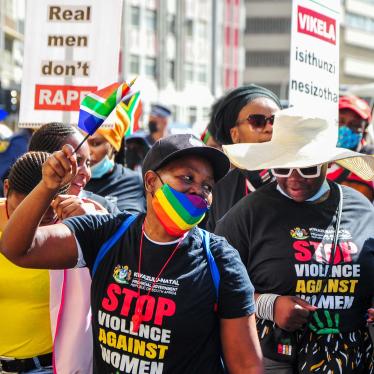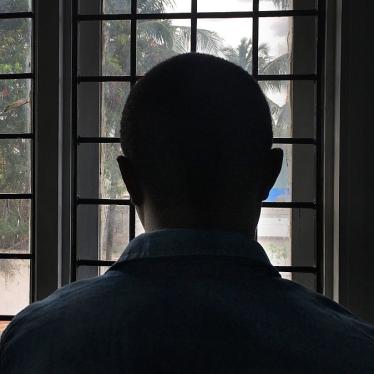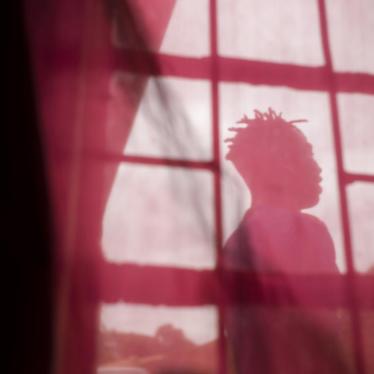Please note this letter is in response to our January 18, 2022 letter addressed to the Justice Ministry in South Africa.
Human Rights Watch
350 Fifth Avenue, 34th Floor
New York, NY 10118-3299
Dear Mr Reid,
Thank you for your letter, dated 18 January 2022.
As you know, the rights and protection of LGBTIQ+ individuals and communities are extremely important to us as government and is also a matter which I have personally championed for many years in my capacity as Deputy Minister.
I need to state, however, that the Department and I were somewhat perplexed by your letter.
Firstly, it was a letter addressed to myself and copied to Ms Busisiwe Dhlamini of the Department of Justice and Constitutional Development (DoJCD). However, I subsequently discovered that you had published it as an open letter on your website without any reference to this in your letter to me. I assume, therefore, that there are other issues that necessitated this approach. I trust you will also publish my response on your website.
Secondly, Human Rights Watch has a representative on the National Task Team on Violence against LGBTI persons and the information which you seek in the letter is readily available to members of that structure. It therefore appears that HRW is seeking information from a structure of which it is an active member and it should thus be familiar with the work being done by the Task Team.
I should also add that including an international Human Rights Organisation, such as Human Rights Watch, on a South African Government/Civil Society Task Team is quite unusual. We have done so, as we truly value civil society inputs and participation and we try to be as inclusive as possible. If one reads your letter, it creates the impression that HRW is not part of the structure at all, but is rather independently monitoring it. Is it the intention of the HRW to remain as part of the NTT structure?
As you, are aware, the NTT has a Rapid Response Team (RTT) which monitors and tracks hate crimes. The RRT's details and progress of the cases as captured on the hate crimes template/matrix is regularly shared with the NTT members, including your representative. (The next NTT meeting is to take place on 28 February 2022.)
I have requested updates from the secretariat of the NTT and wish to advise as follows -
- Bonang Gaela (Murder) from Sebokeng in Gauteng: The case was reported to the RRT and is captured on the template of pending cases. The matter is on the court roll with the suspect in custody and the case has been remanded to May 2022 for sentencing.
- Nohlanhla Kunene (Murder) from Pietermaritzburg in KwaZulu-Nat al: The case was not reported to the RRT. The RRT has made numerous efforts to obtain details of the case by contacting the civil society organisations serving in the KwaZul u-Natal Provincial Task Team, but they do not have the information such as the case number and/or the name of police station where case was reported. Without a case number or the name of the police station where the matter was reported, it is not possible to track the case. We are, once again, appealing to any organisation or person who has any details pertaining to matter to make it available to us urgently.
- Sphandla Khoza (Murder) from KwaMashu in KwaZulu-Natal: The case was reported to the RRT and is captured on the template of pending cases. The matter is on the court roll with the suspect in custody. The case has been remanded to 17, 18 and 20 May 2022 for trial.
- Nathaniel Mbele (Murder) from Vanderbijlpark in Gauteng: The case has been finalised and the suspect was sentenced to a 7-year suspended sentence for culpable homicide.
- Khululekani Gomazi (Murder) from Mpophomeni in KwaZulu-Natal: This case was also not reported to the RRT. Here too the RRT has subsequently made efforts to obtain details of the case in order to follow-up on progress. The RRT contacted civil society organisations serving in the KZN Provincial
- Task Team, but none of the organisations have the information such as the case number and/or the name of police station where the case was reported.
- Andile Nthuthela (Murder) from Kwanobuhle in the Eastern Cape: This case was reported to the RRT, is captured on the template of pending cases and is on the court roll with the suspect in custody. The case has been remanded to 2 March 2022 for copies of the docket to be made available.
- Lonwabo Jack (Murder) from Nyanga in the Western Cape: The case was reported to the RRT and is captured on the template of pending cases. The matter is on the court roll with the suspect (a minor) arrested and then released on bail.
- Lucky Motshabi (Murder) from Dennilton in Limpopo: This case was reported to the RRT, is captured on the template of pending cases and is on the court roll with the suspect in custody. The case has been remanded to 11 April 2022 for pre-trial.
- Phelokazi Mqathana (Murder) from Khayelitsha in the Western Cape: This case was reported to the RRT and is captured on the template of pending cases. The matter was on the court roll and the suspect was out on bail. Whilst out on bail, the suspect failed to appear in court and a warrant of arrest was issued. The case was subsequently struck off the roll. As soon as the suspect is rearrested, the case will be re-enrolled.
- Lindokuhle Mapu (Murder) from Mfuleni in the Western Cape: The case was reported to the RRT and is captured on the template. The matter is on the court roll, with the suspect in custody, and has been remanded to August 2022 for trial.
- Aubrey Boshoga (Murder) from Johannesburg in Gauteng: This case was not reported to the RRT. The RRT has consulted with civil society organisations serving in the Provincial Task Team as well as the secretariat of the Gauteng PTT, but unfortunately they do not have the information such as the case number and/or the name of the police station where the case was reported.
- Masixole Level (Murder) from KwaZakhele in the Eastern Cape: This case was also not reported to the RRT. Here too the RRT made efforts to try and obtain information. They have consulted with
- Masixole Level (Murder) from KwaZakhele in the Eastern Cape: This case was also not reported to the RRT. Here too the RRT made efforts to try and obtain information. They have consulted with civil society organisations serving in the Provincial Task Team and the information (the case number and the name of police station where the case was reported) was subsequently received. The RRT is awaiting details from the SAPS in order to capture the case on the template of pending cases.
- Anele Bhengu (Murder) from KwaMakhutha in Kwa-Zulu Natal: The case was reported to the RRT, but with an incorrect case number. The RRT is awaiting the correct case number from the civil society organisations serving in the KZN Provincial Task Team.
- Lulama Mvandaba (Murder) from Khayelitsha in the Western Cape: The case was reported to the RRT, but with an incorrect case number . The RRT is awaiting the correct case number from civil society organisations serving in the Western Cape Provincial Task Team.
- Sam Mbatha (Murder) from Klipgat in the North West: The case was reported to the RTT. The RRT is awaiting further details from the SAPS in order to capture the case on the template of pending cases.
- Motse Moeketsi (Murder) from Freedom Park in Gauteng: This case was not reported to the RRT. The RRT made numerous efforts to obtain information by contacting the civil society organisations serving in the Provincial Task Team as well as secretariat of the PTT in Gauteng. Unfortunately, none of the organisations have any information such as the case number and/or the name of the police station where the case was reported.
- Sheila Lebelo (Murder) from Atteridgeville in Gauteng: The case was reported to the RRT, and captured on the template of pending cases. The case is still under investigation, with no arrests as yet.
- Thapelo Sehata (Murder) from Senwabarwana in Limpopo: The case was not reported to RRT. The RRT has consulted with civil society organisations serving in the Limpopo Provincial Task Team, but unfortunately no information has been forthcoming.
- Sisanda Gumede (Murder) from KwaZulu-Natal: The case was not reported to the RRT. The RTT has made efforts to try and obtain the relevant information and has consulted with civil society organisations serving in the KZN Provincial Task Team. Unfortunately, the information such as the case number and/or the name of the police station where the case was reported has not been forthcoming.
I am advised that the SAPS are well aware of the cases with incomplete information, but require at least an identity number of the victim, a case number or the name of the police station where the matter was reported, in order to track the matter.
In addition, the RRT continues to make follow-ups with civil society organisations to obtain information. At the previous NTT meeting, the civil society organisations were once again urged to come forward with any information they may have. Once the information has been received the matters are added to the template of active cases. It should also be added that cases reported in the media do not always correlate with what we receive from CSOs and other stakeholders, hence the incomplete information.
Every effort is being made by government to highlight the rights and protection of LGBTIQ+ persons. In this regard, the DoJCD is currently implementing awareness-raising sessions on SOGIESC matters via more than 200 community radio stations across the country.
With regards to the recommendations issued specifically by the CEDAW Committee that you refer to in your letter, the reporting duty in respect of CEDAW lies with the Department of Women, Youth and Persons with Disabilities in the Presidency (DoW) as the lead Department. The next CEDAW periodic report will thus be drafted by this Department and not by the Department of Justice and Constitutional Development.
With regards to the protection of the rights of LGBTIQ+ persons and the role of the NTT going forward, as your representative should have informed you, the National Intervention Strategy (NIS) provides the framework that informs the functioning of the NTT to counter violence and discrimination based on sexual orientation, gender identity, gender expression and sex characteristics in South Africa.
The NIS emphasizes the need to create awareness of LGBTIQ+ rights and to create a society which recognises the needs and challenges experienced by LGBTIQ+ people, and works together to resolve them. The NIS is written with input from government and civil society and is periodically reviewed and updated since it was adopted in 2014 as well as in 2019.
While the NTT was initially created to respond to hate crimes against LGBTIQ+ people, the adoption of the Gender-Based Violence and Femicide National Strategic Plan (NSP GBVF), requires that the NTT reconsiders its NIS in order to also integrate its responses to GBVF-related crimes against LGBTIQ+ people.
As a result, the reviewed NIS is an opportunity to optimally use the NTT to also respond to GBVF in ways that expand access to broader human, socio-economic, civil and political rights to LGBTIQ+ people in South Africa.
The DoJCD remains the primary accountable agency for LGBTIQ+ rights, but will continue to work closely with other government departments, Chapter 9 institutions and mechanisms/structures of the NSP GBVF in order to fulfil the mandate of the NTT. This is a commitment to ensure that there is an intersectional, collaborated response to end discrimination, violence, hate and bias crimes on the grounds of sexual orientation, gender identity, gender expression and sex characteristics.
The NIS provides the framework for the NTT and specifies activities that should take place to reinforce LGBTIQ+ rights. Over time, the objectives of the NTT and the activities necessary to meet these objectives change and therefore the NIS is periodically reviewed and updated. The NIS must also consider available funding resources and be adjusted accordingly. In this regard, a two-day seminar was convened in December 2020 to review the NIS. The seminar included a discussion of the successes and challenges facing the NTT, PTTs and RRTs, which were then used to inform the revision of the NIS.
It was acknowledged that the NIS must expand the scope of human rights violations monitored and addressed beyond hate crimes to also include discrimination and hate speech on the basis of SOGIESC. Furthermore, the NIS requires a clear understanding of, and a stronger focus on, all SOGIESC rights to ensure full inclusion of all LGBTIQ+ people, particularly, transgender, non-binary, gender diverse and intersex people, whose human rights concerns often continue to be invisible, misunderstood and excluded.
To this end, it was recognised that government and human rights institutions must ensure that state obligations are met as outlined in the Yogyakarta Principles (2007) and its recent supplement, the Yogyakarta Principles Plus 10 (2017), which guide States in the application and implementation of international human rights law in relation to sexual orientation, gender identity, gender expression and sex characteristics in their national laws, policies and practices. The applicability of the Yogyakarta Principles to the South African context has been recognised by our courts.
Since LGBTIQ+ people often experience rejection by their families, communities and countries on the basis of their SOGIESC, they frequently also belong to other vulnerable, oppressed and marginalised groups, among others, sex workers, unhoused people, key and vulnerable populations for HIV, STls and TB, and groups affected by xenophobia, such as migrants, asylum seekers and refugees. Apart from homophobia, transphobia and intersexphobia, LGBTIQ+ people therefore tend to suffer compounded intersectional forms of victimisation and unjust criminalisation. lntersectional justice for LGBTIQ+ people requires addressing these forms of systemic violence and human rights violations as well.
The revised NIS takes into consideration the GBVF-NSP, and how to ensure that the protection and the advancement of the rights of LGBTI+ people are adequately and intersectionally funded by government.
The revised NIS will be the most important document outlining and steering the implementation plans to best protect the rights of LGBTIQ+ persons in South Africa. Inputs and comments on the revised NIS have been sought from civil society bodies and HRW's inputs have also been incorporated into the revised draft.
I trust the above will be of assistance.
Yours sincerely
John Jeffery, MP
Deputy Minister of Justice and Constitutional Development
Date: 17/02/2022







